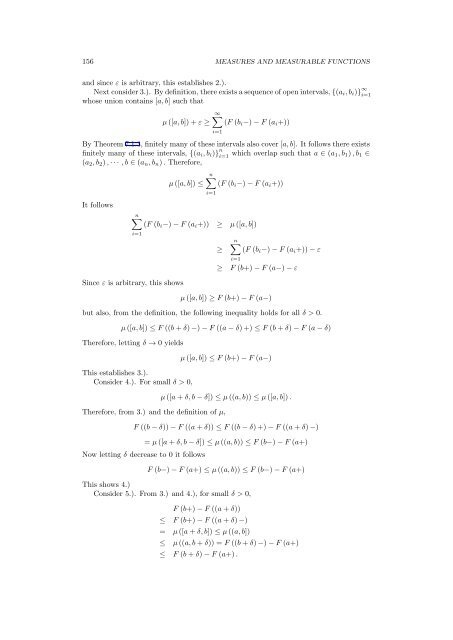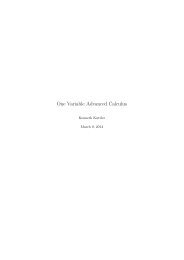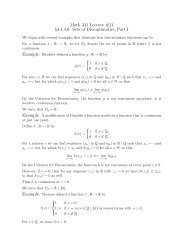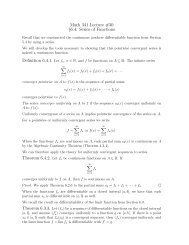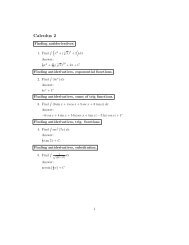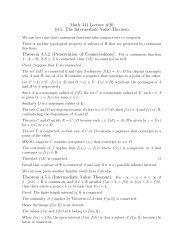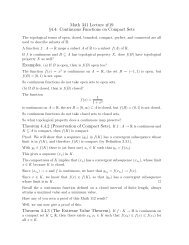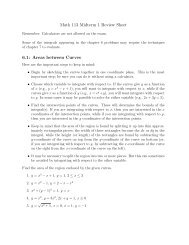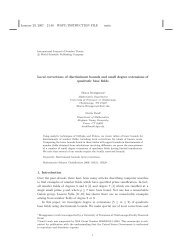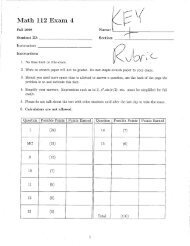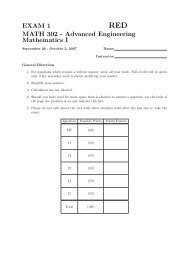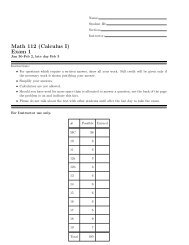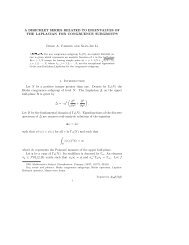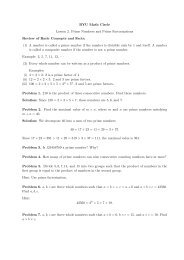- Page 4 and 5:
4 CONTENTS5 Continuous Functions 85
- Page 6 and 7:
6 CONTENTS11.5 Integration Of Diffe
- Page 8 and 9:
8 CONTENTS
- Page 10 and 11:
10 INTRODUCTION
- Page 12 and 13:
12 SOME FUNDAMENTAL CONCEPTSthere i
- Page 14 and 15:
14 SOME FUNDAMENTAL CONCEPTSthat is
- Page 16 and 17:
16 SOME FUNDAMENTAL CONCEPTSFollow
- Page 18 and 19:
18 SOME FUNDAMENTAL CONCEPTSDefinit
- Page 20 and 21:
20 SOME FUNDAMENTAL CONCEPTSTheorem
- Page 22 and 23:
22 SOME FUNDAMENTAL CONCEPTSNext ob
- Page 24 and 25:
24 BASIC LINEAR ALGEBRA6 · (2, 6)(
- Page 26 and 27:
26 BASIC LINEAR ALGEBRA3.2 Subspace
- Page 28 and 29:
28 BASIC LINEAR ALGEBRATheorem 3.2.
- Page 30 and 31:
30 BASIC LINEAR ALGEBRAProof: This
- Page 32 and 33:
32 BASIC LINEAR ALGEBRAwhich showsL
- Page 34 and 35:
34 BASIC LINEAR ALGEBRAsuch thatl i
- Page 36 and 37:
36 BASIC LINEAR ALGEBRA3.4 Block Mu
- Page 38 and 39:
38 BASIC LINEAR ALGEBRAnumbers in (
- Page 40 and 41:
40 BASIC LINEAR ALGEBRAProof: Let (
- Page 42 and 43:
42 BASIC LINEAR ALGEBRABy Corollary
- Page 44 and 45:
44 BASIC LINEAR ALGEBRAProposition
- Page 46 and 47:
46 BASIC LINEAR ALGEBRADefinition 3
- Page 48 and 49:
48 BASIC LINEAR ALGEBRAcontrary to
- Page 50 and 51:
50 BASIC LINEAR ALGEBRALemma 3.6.2
- Page 52 and 53:
52 BASIC LINEAR ALGEBRA3. Let L ∈
- Page 54 and 55:
54 BASIC LINEAR ALGEBRATheorem 3.8.
- Page 56 and 57:
56 BASIC LINEAR ALGEBRALemma 3.8.9
- Page 58 and 59:
58 BASIC LINEAR ALGEBRA3.8.5 Orthon
- Page 60 and 61:
60 BASIC LINEAR ALGEBRAis in L (H 1
- Page 62 and 63:
62 BASIC LINEAR ALGEBRA3.8.7 Schur
- Page 64 and 65:
64 BASIC LINEAR ALGEBRAProof: Let {
- Page 66 and 67:
66 BASIC LINEAR ALGEBRANow for x, y
- Page 68 and 69:
68 BASIC LINEAR ALGEBRAby 3.47.Sinc
- Page 70 and 71:
70 BASIC LINEAR ALGEBRA8. A normal
- Page 72 and 73:
72 SEQUENCESTheorem 4.1.5 Suppose {
- Page 74 and 75:
74 SEQUENCESTheorem 4.1.8 Let {x n
- Page 76 and 77:
76 SEQUENCESTheorem 4.3.2 The inter
- Page 78 and 79:
78 SEQUENCESHowever, this sequence
- Page 80 and 81:
80 SEQUENCESGiven R is complete, th
- Page 82 and 83:
82 SEQUENCES10. Suppose A ⊆ R n a
- Page 84 and 85:
84 SEQUENCES
- Page 86 and 87:
86 CONTINUOUS FUNCTIONS≤ |a| |f (
- Page 88 and 89:
88 CONTINUOUS FUNCTIONSof f −1 (U
- Page 90 and 91:
90 CONTINUOUS FUNCTIONSProof: First
- Page 92 and 93:
92 CONTINUOUS FUNCTIONSlet C ∩ (
- Page 94 and 95:
94 CONTINUOUS FUNCTIONSProof: Suppo
- Page 96 and 97:
96 CONTINUOUS FUNCTIONSThen the fol
- Page 98 and 99:
98 CONTINUOUS FUNCTIONS5.6 Polynomi
- Page 100 and 101:
100 CONTINUOUS FUNCTIONSThus the ex
- Page 102 and 103:
102 CONTINUOUS FUNCTIONSTherefore,
- Page 104 and 105:
104 CONTINUOUS FUNCTIONSProof: Let
- Page 106 and 107: 106 CONTINUOUS FUNCTIONSand so ( )3
- Page 108 and 109: 108 CONTINUOUS FUNCTIONSLet( )a1b k
- Page 110 and 111: 110 CONTINUOUS FUNCTIONSTheorem 5.8
- Page 112 and 113: 112 CONTINUOUS FUNCTIONS5.9 Ascoli
- Page 114 and 115: 114 CONTINUOUS FUNCTIONSBy equicont
- Page 116 and 117: 116 CONTINUOUS FUNCTIONS11. By Theo
- Page 118 and 119: 118 CONTINUOUS FUNCTIONS28. Let X b
- Page 120 and 121: 120 CONTINUOUS FUNCTIONS
- Page 122 and 123: 122 THE DERIVATIVEor equivalently,|
- Page 124 and 125: 124 THE DERIVATIVEIt follows≡limt
- Page 126 and 127: 126 THE DERIVATIVEand soNow dividin
- Page 128 and 129: 128 THE DERIVATIVEprovided ||v|| is
- Page 130 and 131: 130 THE DERIVATIVEare both linear.T
- Page 132 and 133: 132 THE DERIVATIVE6.7.1 Some Standa
- Page 134 and 135: 134 THE DERIVATIVEDefinition 6.8.4
- Page 136 and 137: 136 THE DERIVATIVEAs implied above,
- Page 138 and 139: 138 THE DERIVATIVEwhich requires ea
- Page 140 and 141: 140 THE DERIVATIVETheorem 6.10.3 (i
- Page 142 and 143: 142 THE DERIVATIVEThen there exist
- Page 144 and 145: 144 THE DERIVATIVENow the idea is t
- Page 146 and 147: 146 THE DERIVATIVETheorem 6.11.5 If
- Page 148 and 149: 148 THE DERIVATIVEare linearly inde
- Page 150 and 151: 150 THE DERIVATIVEShow {x 1 , · ·
- Page 152 and 153: 152 THE DERIVATIVE25. Let (x, y) be
- Page 154 and 155: 154 MEASURES AND MEASURABLE FUNCTIO
- Page 158 and 159: 158 MEASURES AND MEASURABLE FUNCTIO
- Page 160 and 161: 160 MEASURES AND MEASURABLE FUNCTIO
- Page 162 and 163: 162 MEASURES AND MEASURABLE FUNCTIO
- Page 164 and 165: 164 MEASURES AND MEASURABLE FUNCTIO
- Page 166 and 167: 166 MEASURES AND MEASURABLE FUNCTIO
- Page 168 and 169: 168 MEASURES AND MEASURABLE FUNCTIO
- Page 170 and 171: 170 MEASURES AND MEASURABLE FUNCTIO
- Page 172 and 173: 172 MEASURES AND MEASURABLE FUNCTIO
- Page 174 and 175: 174 MEASURES AND MEASURABLE FUNCTIO
- Page 176 and 177: 176 MEASURES AND MEASURABLE FUNCTIO
- Page 178 and 179: 178 MEASURES AND MEASURABLE FUNCTIO
- Page 180 and 181: 180 MEASURES AND MEASURABLE FUNCTIO
- Page 182 and 183: 182 THE ABSTRACT LEBESGUE INTEGRALL
- Page 184 and 185: 184 THE ABSTRACT LEBESGUE INTEGRALa
- Page 186 and 187: 186 THE ABSTRACT LEBESGUE INTEGRALD
- Page 188 and 189: 188 THE ABSTRACT LEBESGUE INTEGRALa
- Page 190 and 191: 190 THE ABSTRACT LEBESGUE INTEGRALa
- Page 192 and 193: 192 THE ABSTRACT LEBESGUE INTEGRALP
- Page 194 and 195: 194 THE ABSTRACT LEBESGUE INTEGRALP
- Page 196 and 197: 196 THE ABSTRACT LEBESGUE INTEGRALF
- Page 198 and 199: 198 THE ABSTRACT LEBESGUE INTEGRALT
- Page 200 and 201: 200 THE ABSTRACT LEBESGUE INTEGRALa
- Page 202 and 203: 202 THE ABSTRACT LEBESGUE INTEGRALC
- Page 204 and 205: 204 THE ABSTRACT LEBESGUE INTEGRALN
- Page 206 and 207:
206 THE ABSTRACT LEBESGUE INTEGRALc
- Page 208 and 209:
208 THE LEBESGUE INTEGRAL FOR FUNCT
- Page 210 and 211:
210 THE LEBESGUE INTEGRAL FOR FUNCT
- Page 212 and 213:
212 THE LEBESGUE INTEGRAL FOR FUNCT
- Page 214 and 215:
214 THE LEBESGUE INTEGRAL FOR FUNCT
- Page 216 and 217:
216 THE LEBESGUE INTEGRAL FOR FUNCT
- Page 218 and 219:
218 THE LEBESGUE INTEGRAL FOR FUNCT
- Page 220 and 221:
220 THE LEBESGUE INTEGRAL FOR FUNCT
- Page 222 and 223:
222 THE LEBESGUE INTEGRAL FOR FUNCT
- Page 224 and 225:
224 THE LEBESGUE INTEGRAL FOR FUNCT
- Page 226 and 227:
226 THE LEBESGUE INTEGRAL FOR FUNCT
- Page 228 and 229:
228 THE LEBESGUE INTEGRAL FOR FUNCT
- Page 230 and 231:
230 THE LEBESGUE INTEGRAL FOR FUNCT
- Page 232 and 233:
232 THE LEBESGUE INTEGRAL FOR FUNCT
- Page 234 and 235:
234 THE LEBESGUE INTEGRAL FOR FUNCT
- Page 236 and 237:
236 THE LEBESGUE INTEGRAL FOR FUNCT
- Page 238 and 239:
238 THE LEBESGUE INTEGRAL FOR FUNCT
- Page 240 and 241:
240 THE LEBESGUE INTEGRAL FOR FUNCT
- Page 242 and 243:
242 THE LEBESGUE INTEGRAL FOR FUNCT
- Page 244 and 245:
244 THE LEBESGUE INTEGRAL FOR FUNCT
- Page 246 and 247:
246 THE LEBESGUE INTEGRAL FOR FUNCT
- Page 248 and 249:
248 THE LEBESGUE INTEGRAL FOR FUNCT
- Page 250 and 251:
250 THE LEBESGUE INTEGRAL FOR FUNCT
- Page 252 and 253:
252 THE LEBESGUE INTEGRAL FOR FUNCT
- Page 254 and 255:
254 THE LEBESGUE INTEGRAL FOR FUNCT
- Page 256 and 257:
256 THE LEBESGUE INTEGRAL FOR FUNCT
- Page 258 and 259:
258 BROUWER DEGREEDefinition 10.1.1
- Page 260 and 261:
260 BROUWER DEGREEIt is obvious tha
- Page 262 and 263:
262 BROUWER DEGREETherefore, for an
- Page 264 and 265:
264 BROUWER DEGREE= −A.Therefore,
- Page 266 and 267:
266 BROUWER DEGREEProof: From Lemma
- Page 268 and 269:
268 BROUWER DEGREEfor all t ∈ [0,
- Page 270 and 271:
270 BROUWER DEGREELemma 10.3.2 Let
- Page 272 and 273:
272 BROUWER DEGREELemma 10.4.2 Let
- Page 274 and 275:
274 BROUWER DEGREEwhich is clearly
- Page 276 and 277:
276 BROUWER DEGREEThe product formu
- Page 278 and 279:
278 BROUWER DEGREEProof: Let B (y,3
- Page 280 and 281:
280 BROUWER DEGREEand y /∈ C. Sin
- Page 282 and 283:
282 BROUWER DEGREEwhich is the same
- Page 284 and 285:
284 BROUWER DEGREEFor y ∈ S, let
- Page 286 and 287:
286 BROUWER DEGREELetdist ( )y, WjC
- Page 288 and 289:
288 BROUWER DEGREE∞∑∫∞∑
- Page 290 and 291:
290 BROUWER DEGREE11. Establish the
- Page 292 and 293:
292 BROUWER DEGREE19. Using Problem
- Page 294 and 295:
294 INTEGRATION OF DIFFERENTIAL FOR
- Page 296 and 297:
296 INTEGRATION OF DIFFERENTIAL FOR
- Page 298 and 299:
298 INTEGRATION OF DIFFERENTIAL FOR
- Page 300 and 301:
300 INTEGRATION OF DIFFERENTIAL FOR
- Page 302 and 303:
302 INTEGRATION OF DIFFERENTIAL FOR
- Page 304 and 305:
304 INTEGRATION OF DIFFERENTIAL FOR
- Page 306 and 307:
306 INTEGRATION OF DIFFERENTIAL FOR
- Page 308 and 309:
308 INTEGRATION OF DIFFERENTIAL FOR
- Page 310 and 311:
310 INTEGRATION OF DIFFERENTIAL FOR
- Page 312 and 313:
312 INTEGRATION OF DIFFERENTIAL FOR
- Page 314 and 315:
314 INTEGRATION OF DIFFERENTIAL FOR
- Page 316 and 317:
316 INTEGRATION OF DIFFERENTIAL FOR
- Page 318 and 319:
318 INTEGRATION OF DIFFERENTIAL FOR
- Page 320 and 321:
320 INTEGRATION OF DIFFERENTIAL FOR
- Page 322 and 323:
322 INTEGRATION OF DIFFERENTIAL FOR
- Page 324 and 325:
324 INTEGRATION OF DIFFERENTIAL FOR
- Page 326 and 327:
326 THE LAPLACE AND POISSON EQUATIO
- Page 328 and 329:
328 THE LAPLACE AND POISSON EQUATIO
- Page 330 and 331:
330 THE LAPLACE AND POISSON EQUATIO
- Page 332 and 333:
332 THE LAPLACE AND POISSON EQUATIO
- Page 334 and 335:
334 THE LAPLACE AND POISSON EQUATIO
- Page 336 and 337:
336 THE LAPLACE AND POISSON EQUATIO
- Page 338 and 339:
338 THE LAPLACE AND POISSON EQUATIO
- Page 340 and 341:
340 THE LAPLACE AND POISSON EQUATIO
- Page 342 and 343:
342 THE LAPLACE AND POISSON EQUATIO
- Page 344 and 345:
344 THE LAPLACE AND POISSON EQUATIO
- Page 346 and 347:
346 THE LAPLACE AND POISSON EQUATIO
- Page 348 and 349:
348 THE LAPLACE AND POISSON EQUATIO
- Page 350 and 351:
350 THE JORDAN CURVE THEOREMNow the
- Page 352 and 353:
352 THE JORDAN CURVE THEOREMA solid
- Page 354 and 355:
354 THE JORDAN CURVE THEOREMLemma 1
- Page 356 and 357:
356 THE JORDAN CURVE THEOREMwhere R
- Page 358 and 359:
358 THE JORDAN CURVE THEOREMa QHKbN
- Page 360 and 361:
360 THE JORDAN CURVE THEOREM
- Page 362 and 363:
362 LINE INTEGRALSLet x t ≡ tx 1
- Page 364 and 365:
364 LINE INTEGRALSActually, people
- Page 366 and 367:
366 LINE INTEGRALSand if t is in th
- Page 368 and 369:
368 LINE INTEGRALSProof: The functi
- Page 370 and 371:
370 LINE INTEGRALSProof of the clai
- Page 372 and 373:
372 LINE INTEGRALS(γ s − 2h + t
- Page 374 and 375:
374 LINE INTEGRALS≤≤n∑∫ tj|
- Page 376 and 377:
376 LINE INTEGRALSand so|F (γ (t))
- Page 378 and 379:
378 LINE INTEGRALSLet m be the last
- Page 380 and 381:
380 LINE INTEGRALSLemma 14.3.5 In t
- Page 382 and 383:
382 LINE INTEGRALSLemma 14.3.6 Let
- Page 384 and 385:
384 LINE INTEGRALSwheref (x, y) ≡
- Page 386 and 387:
386 LINE INTEGRALSwhere B δ is the
- Page 388 and 389:
388 LINE INTEGRALSto Green’s theo
- Page 390 and 391:
390 LINE INTEGRALSDefinition 14.4.2
- Page 392 and 393:
392 LINE INTEGRALS14.5 Interpretati
- Page 394 and 395:
394 LINE INTEGRALS✻a × b✣θc
- Page 396 and 397:
396 LINE INTEGRALSSuppose then that
- Page 398 and 399:
398 LINE INTEGRALSProposition 14.6.
- Page 400 and 401:
400 LINE INTEGRALSCombining these l
- Page 402 and 403:
402 LINE INTEGRALSIn this case the
- Page 404 and 405:
404 LINE INTEGRALSThen as in the pr
- Page 406 and 407:
406 LINE INTEGRALSConsider only h
- Page 408 and 409:
408 LINE INTEGRALSwhere |g (w)| <
- Page 410 and 411:
410 LINE INTEGRALS6. In the situati
- Page 412 and 413:
412 LINE INTEGRALS18. Using Problem
- Page 414 and 415:
414 LINE INTEGRALS24. Let f, g be a
- Page 416 and 417:
416 LINE INTEGRALSShow this equals
- Page 418 and 419:
418 LINE INTEGRALS
- Page 420 and 421:
420 HAUSDORFF MEASURES AND AREA FOR
- Page 422 and 423:
422 HAUSDORFF MEASURES AND AREA FOR
- Page 424 and 425:
424 HAUSDORFF MEASURES AND AREA FOR
- Page 426 and 427:
426 HAUSDORFF MEASURES AND AREA FOR
- Page 428 and 429:
428 HAUSDORFF MEASURES AND AREA FOR
- Page 430 and 431:
430 HAUSDORFF MEASURES AND AREA FOR
- Page 432 and 433:
432 HAUSDORFF MEASURES AND AREA FOR
- Page 434 and 435:
434 HAUSDORFF MEASURES AND AREA FOR
- Page 436 and 437:
436 HAUSDORFF MEASURES AND AREA FOR
- Page 438 and 439:
438 HAUSDORFF MEASURES AND AREA FOR
- Page 440 and 441:
440 HAUSDORFF MEASURES AND AREA FOR
- Page 442 and 443:
442 HAUSDORFF MEASURES AND AREA FOR
- Page 444 and 445:
444 HAUSDORFF MEASURES AND AREA FOR
- Page 446 and 447:
446 HAUSDORFF MEASURES AND AREA FOR
- Page 448 and 449:
448 HAUSDORFF MEASURES AND AREA FOR
- Page 450 and 451:
450 HAUSDORFF MEASURES AND AREA FOR
- Page 452 and 453:
452 HAUSDORFF MEASURES AND AREA FOR
- Page 454 and 455:
454 HAUSDORFF MEASURES AND AREA FOR
- Page 456 and 457:
456 HAUSDORFF MEASURES AND AREA FOR
- Page 458 and 459:
458 HAUSDORFF MEASURES AND AREA FOR
- Page 460 and 461:
460 BIBLIOGRAPHY[21] Gurtin M. An i
- Page 462 and 463:
462 INDEXderivative, 307exact, 322i
- Page 464:
464 INDEXvectors, 25Vitaliconvergen


